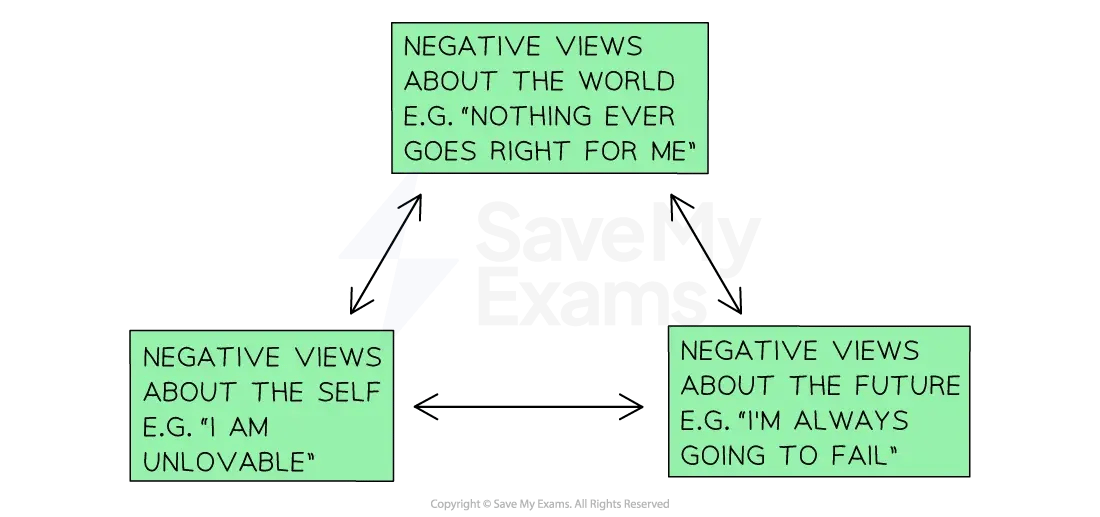Syllabus Edition
First teaching 2025
First exams 2027
Beck's Model of MDD (DP IB Psychology): Revision Note
Beck’s model of MDD
The cognitive approach explains behaviour through mental processes such as thinking, decision-making, memory, and perception
In relation to MDD, the approach assumes depression results from faulty or irrational thought processes, where depressed individuals rely too heavily on cognitive biases
The cognitive triad
Beck (1963) developed an explanation of MDD known as the cognitive triad, which was based on depressed patients he had worked with
The cognitive triad is divided into three patterns of negative thinking:
Negative view about the self, e.g., 'I'm worthless'
Negative view about the world, e.g., 'Nobody cares about me'
Negative views about the future, e.g., 'Things will never get better'

Features of depressed thinking
Beck suggested that the irrational thought patterns below may stem from adverse childhood experiences
Personalisation: irrationally blaming the world or events on oneself (e.g., 'Everyone hates me – even the bus hates me because it didn’t stop')
Negative automatic thoughts: always seeking out the negative in situations (e.g., 'A promotion just means more stress')
Catastrophising: expecting the worst possible outcome (e.g., 'A low mark in this essay means I’ll fail the IB and end up broke')
Overgeneralisations: applying one negative event to all situations (e.g., 'What a bad date – I’ll never find anyone')
Diathesis–stress model
Beck proposed a diathesis-stress component of his theory which states that some people are naturally predisposed to developing MDD
Environmental stressors (e.g., job loss) may trigger depression in vulnerable individuals, while others may not be affected in the same way
This theory claims that MDD can develop from a
combination of a genetic predisposition and environmental stress
This explains why some members of a family develop MDD while others do not, despite being genetically close
E.g., James and Jack both fail their driving test
James is unaffected by this outcome and says he'll take the test again soon
Jack feels devastated by this outcome and falls into a deep depression
Evaluation of Beck’s model of MDD
Strengths
There is good research evidence to support Beck’s theory
E.g., Bothwell & Scott (1997) found that cognitive biases were linked to symptoms of depression
The theory has practical applications to treating depression
E.g., The model underpins CBT (cognitive behavioural therapy), which helps patients identify, challenge, and replace irrational thoughts, leading to reduced symptoms of depression
Limitations
Beck's theory has limited explanatory power
It explains how irrational thinking works but not why it develops in the first place (e.g., childhood experiences, biology)
Beck’s theory is culturally biased, as the model does not fully apply to collectivist cultures
It focuses on individual thinking patterns and one-to-one therapy, which may not reflect cultural differences in how depression is experienced or treated
Link to Concepts
Causality
Beck claimed that negative, irrational thoughts lead to depression, which could lead to some interesting discussion on the nature of causality
E.g., is it possible to think yourself depressed or does being depressed cause an increase in negative thoughts?
Change
Beck’s theory does not really account for the unpredictable nature of depression
The depressed person is not always depressed in the same way across time, i.e., there is a lack of stability to their MDD as it does not always present in the same way
The model should be able to acknowledge the shifting nature of depression and that MDD is not necessarily a stable, lifelong condition

Unlock more, it's free!
Was this revision note helpful?
